Batangas State University
The Batangas State University (BatStateU; Filipino: Pambansang Pamantasan ng Batangas) is a Level IV state university [8] in the province of Batangas, Philippines. Established as a manual training school in 1903, Batangas State University is the oldest higher education institution in the country's CALABARZON Region.[9][10] It was converted into a state college in 1968 through RA 5270, and was renamed Pablo Borbon Memorial Institute of Technology.[11] It was finally elevated into a state university in 2001 by virtue of RA 9045.[12] It has 11 campuses and more than 35,000 students enrolled in over 110 undergraduate and graduate degree programs.
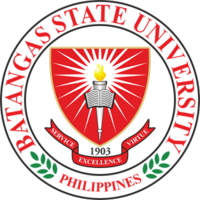 Leading Innovations, Transforming Lives | |
Former names | List
|
|---|---|
| University Vision | A premier national university that develops leaders in the global knowledge economy. |
| Type | state university[1] |
| Established | 1903[2] |
Academic affiliations | Association of Universities in Asia and the Pacific; University Mobility in Asia and the Pacific |
| President | Tirso A. Ronquillo, PhD, ASEAN Eng[3] |
| Students | 37,966 (AY 2016–2017)[4] |
| Location | Batangas , , |
| Campus | Urban Main campus: Rizal Ave, Batangas City |
| Student Publication | The LATHE[5] |
| Colors | Red and white [6] |
| Nickname | BatStateU Red Spartans |
| Mascot | Red Spartans[7] |
| Website | batstate-u.edu.ph |
Batangas State University was named one of the country's model higher education institutions by the Commission on Higher Education or CHED in 2016.[13][14] The university's Electronics Engineering program is designated by CHED as a national Center of Excellence, and its Electrical Engineering, Mechanical Engineering, Development Communication, and Teacher Education programs are national Centers of Development.[15][16] It has ISO 9001:2015 certification from TÜV Rheinland Philippines, Inc.,[17] and is host to the first China-Philippines Silk Road Institute in the country.[18]
BatStateU is the first state university in the Philippines with engineering and information technology programs accredited by the US-based Accreditation Board for Engineering and Technology or ABET – Engineering Accreditation Commission and Computing Accreditation Commission.[19][20][21] With 15 development centers, it is recognized by the Regional Development Council of Region IV-A as the Regional Center for Technology Business Incubation and Development, and as the Regional Center for Science, Technology, Engineering, and Environment Research.[22]
In 2020, the university received a three-star rating from Quacquarelli Symonds Stars University rating, and is part of the Top Universities list.[23] Through Proclamation No. 947, President Rodrigo Roa Duterte designated the BatStateU Knowledge, Innovation, and Science Technology or KIST Park as a Special Economic Zone.[24] It is the first KIST Park registered by the Philippine Economic Zone Authority or PEZA.[25] This was officially launched on July 20, 2020 in virtual ceremonies attended by key government and industry officials.[26]
History
Early years
Batangas State University was originally established as a Manual Training School in 1903 through the supervision of its first American principal, Mr. Scheer. The institution aimed to train youth for beneficial jobs specifically in woodworking. Two years later, it was renamed Batangas Trade School with Mr. Schartz, Zacarias Canent, Isaias Maclang, and Nad Pascual Magcamit as its principals, successively. The school was destroyed by fire in 1928 and classes were held temporarily at the old government building near the present Basilica of Immaculate Conception church. The construction of the school building at the site of Batangas State University's Main Campus I began in 1932.[2][27]
After the Liberation, Batangas Trade School resumed activities on 10 September 1945 with Vicente J. Mendoza as its principal. Under the Philippine Rehabilitation Act of 1946, the school was renovated and the first batch of female students were admitted when courses in food trade, garment, and cosmetology were introduced as a response to the growing need of female workforce.[2][27]
Pablo Borbon era
Sometime before 1952, the school was renamed Pablo Borbon Memorial Trade School as a tribute to Pablo Borbon who served as the 6th governor of Batangas from 1910 to 1916. Through Republic Act No. 741, the school gained a national trade status on 18 June 1952.[28] Again, it was renamed Pablo Borbon Regional School of Arts and Trades on 22 June 1957 as mandated by Republic Act No. 1957.[29] Two months later, Arsenio Galauran became the school superintendent while the institution started to offer technical courses. Galauran was succeeded by Vicente Mendoza in November 1962. Mendoza was then followed by Rosauro de Leon on 8 June 1963. It was during de Leon's administration that the school began to offer terminal classes in auto mechanics, cosmetology, electronics, dressmaking, machine shop practice, and radio mechanics.[27] On 19 June 1965, Republic Act No. 4582 directed the school to offer degree courses in industrial education and industrial arts.[30]
As authorized by Republic Act No. 5270, Pablo Borbon Regional School of Arts and Trades was elevated into a state college and renamed Pablo Borbon Memorial Institute of Technology or PBMIT on 15 June 1968.[31] At the time of its conversion, it was the 23rd state college in the country. Rosauro de Leon was appointed to become PBMIT's first president.[2]
In 1971, the newly established state college started to offer courses in electrical and mechanical engineering courses. Sometime before 1973, a secondary school department that came to be known as the Laboratory School was inaugurated. By 1973, Marcos Ato was its principal when the Laboratory School adopted the Revised Secondary Education Program or RSEP. The following year, civil engineering was offered in PBMIT while the Graduate School was formally opened with Master of Arts in Industrial Education major in Administration and Supervision as its pioneer course. This was followed in 1978 when Master of Management specialized in Business and Public Managements was offered in partnership with former U.P. College of Public Administration. Earlier in 1977, PBMIT launched the Extension Trade Training Program that aimed to train out-of-school youth in electricity, food trades, mechanics, practical automotive, and woodcraft in a span of 200 hours.[2][27]
Isabelo R. Evangelio succeeded de Leon as college president in 1983. A year after Evangelio's ascendancy to the office, PBMIT acquired a three-hectare land in Batangas City. Eventually, this would become the site of Batangas State University's Main Campus II. Evangelio was succeeded by Mariano O. Albayalde in 1986. In the same year, PBMIT broadened its undergraduate programs in home economics, mathematics, and science. In association with Technological University of the Philippines or TUP, a doctoral degree in Industrial Education Management was offered in 1987. A science class with emphasis in mathematics and science of the Special Science Curriculum was piloted in the Laboratory School from 1987 to 1990 through the supervision of its principal, Mercedes del Rosario.[2][27]
Albayalde's presidency was followed by Ernesto M. De Chavez in 1989. Courses in English language, elementary and secondary education, and computer science were made available the subsequent year. Simultaneously, PBMIT spearheaded the Dual Training System or DTS that was intended for aspiring technicians. DTS was conducted on a trimester basis; classes were held four days a week in industry and two days in school. By 1991, two more courses in development communication and biology were offered. Starting from 1993, the Laboratory School adopted the Technology Based-Curriculum to conform with PBMIT's Science Education Program. Together with Philippine Science High School and Quezon City Science High School, the three were the first secondary schools in the Philippines to adopt the aforementioned curriculum.[2] In 1994, an extension campus was opened in Balayan with welding fabrication and automotive, electrical, and electronics technology as its premier courses.[2][27]
From 1995 to 2000, numerous courses in various disciplines were introduced. Some of these were architecture, business administration, chemical engineering, sanitary engineering, fine arts, information technology, psychology, and public administration. The former College of Liberal Arts, Science, and Computer Studies; School of Accountancy, Business and Economics, Center for Gender, and Poverty Studies; and School of Food Science were established. A separate department for primary students was created that offered Kindergarten I and II in preschool and Grade I in elementary.[2][27]
Conversion into a State University
| Presidents of PBMIT and BatStateU |
| Rosauro de Leon, 1968–1983 |
| Isabelo R. Evangelio, 1983–1986 |
| Mariano O. Albayalde, 1986–1989 |
| Ernesto M. De Chavez, 1989–2006 |
| Nora L. Magnaye, 2006–2014 |
| Tirso A. Ronquillo, 2014–present |
On 22 March 2001, Pablo Borbon Memorial Institute of Technology was converted into Batangas State University by virtue of Republic Act No. 9045.[1] Ernesto M. De Chavez became the university's first president. The conversion also led to the unification of the Grade School Department and the Laboratory School from which the Integrated School came into existence with Maxima Ramos as its first director.[2] On 17 July 2006, Nora L. Magnaye assumed as the university's second president and the first woman to hold the position. During her presidency, Batangas State University started to establish ties with different universities and colleges in China, Malaysia, South Korea, Thailand, and Vietnam.
On 17 July 2014, Tirso A. Ronquillo was appointed as the third university president. Since 2015, massive infrastructure development was concretized in the university's campuses. . It was during Dr. Ronquillo’s term when the university became a Level IV university, [8] received ISO 9001:2015 certification, [17] and was awarded Three Stars by the QS Stars rating.[23] It was also during this time when its engineering and information technology programs were accredited by the US-based Accrediting Board for Engineering and Technology. [19][20][21] The university established the first KIST park in the country, started offering new emerging programs, developed research and development centers, and expanded international partnerships during his term. [25][26][32] In December 2019, the University launched its ten-year strategic plan highlighted by its new vision, mission, and strategic direction until 2029.[33]
Present Administration
The BatStateU Board of Regents
The Batangas State University Board of Regents is the highest governing body of the university, as stipulated in Sec. 5 of RA 9045.[12] The Board regularly convenes at least once every quarter. Currently, it is composed of the following:
- Dr. Lilian De Las Llagas, CHED Commissioner – Chairperson-designate
- Dr. Tirso Ronquillo, University President – Vice Chairperson
- Sen. Joel Villanueva, Chair of the Senate Committee on Higher and Technical Education
- Rep. Mark Go, Chair of the House Committee on Higher and Technical Education
- Dir. Luis Banua, Regional Director of the National Economic and Development Authority, Regional Office IV-A
- Dir. Alexander Madrigal, Regional Director of the Department of Science and Technology, Regional Office IV-A
- Dr. Jesse Nelson Llama, President of the Confederation of BatStateU Faculty Associations
- Mr. Arvin Lloyd Atienza, President of the Confederation of BatStateU Student Associations
- Engr. Armando Plata, President of the Confederation of BatStateU Alumni Associations
- Mr. Faustino Caedo, Private/ Prominent Citizen selected by the Board of Regents
- Prof. Enrico Dalangin – University Secretary
The Executive Committee
The university's Executive Committee (ExeCom) serves as the institution's management committee that spearheads strategic planning, internal policy formulation, decision making, and policies implementation based on Board-approved policies and guidelines. It is chaired by the University President. Its members are the Vice Presidents and the Executive Directors of campuses.
The Administrative and Academic Councils
The university has an Administrative Council, as stipulated in Section 10 of RA 9045.[12] It consists of the president of the University as the chairman, the vice presidents, deans, directors, and other officials of equal rank as members. The Administrative Council reviews and recommends to the Board policies governing the administration, management and development planning of the University for appropriate action.
The Academic Council, as provided in Section 11 of RA 9045,[12] has the president of the University as chairman and all members of the instructional staff with the rank of not lower than assistant professor as members. This council has the power to review and recommend the curricular offerings and rules of discipline of the University, subject for appropriate action of the Board. It shall fix the requirements for admission of students, as well as for graduation and the conferment of degrees, subject to review and/or approval by the Board.
Campuses
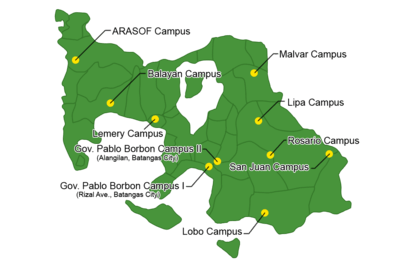
Since 2003, Batangas State University has two main, two satellites, and six extension campuses in Batangas.[34] To maintain camaraderie between its campuses, the university administers several annual activities like quiz bees and intramurals.[35]
The university's main campuses are located in Batangas City; Pablo Borbon Main I is at Rizal Avenue, Poblacion while Pablo Borbon Main II is within Golden Country Homes Subdivision in Brgy. Alangilan.[34] Both are named in honor of former governor Pablo Borbon. Being the oldest of all the campuses, Main I is the site of the former Batangas Trade School which was established in 1932.[2] Since then, Main I has been the flagship campus and the seat of the administration of the university. The site of the second oldest campus, Main II, was acquired in 1984.[27]
On 25 February 2000, the Apolinario R. Apacible School of Fisheries or ARASOF in Brgy. Bucana, Nasugbu was incorporated to the former Pablo Borbon Memorial Institute of Technology as its first satellite campus.[36] With the implementation of Republic Act No. 9045, two more satellite campuses were incorporated to the then newly formed Batangas State University; this were Jose P. Laurel Polytechnic College or JPLPC in Poblacion, Malvar and a branch of the Polytechnic University of the Philippines or PUP in Poblacion, Santo Tomas.[1] However, on 22 May 2007, Congress enacted Republic Act No. 9472 that excluded PUP Santo Tomas from Batangas State University.[37]
Earlier in 1994, the university's third oldest and first extension campus was inaugurated in Brgy. Caloocan, Balayan. In 2000, a memorandum of agreement was signed for the purpose of establishing more extension campuses in Lipa City, Rosario, Lobo, San Juan, Calaca, Padre Garcia, San Pascual, and Taysan.[27] The said campus in Brgy. Marawoy, Lipa City was named Don Claro M. Recto campus as a tribute to the well-known Filipino politician while the one in Brgy. Namunga, Rosario was named Jose B. Zuño campus in honor of Rosario's first postwar mayor. The extension campuses in Lobo and San Juan were constructed in Brgy. Masaguitsit and Brgy. Talahiban, respectively.[36] Recently, a ceremony was held on 8 June 2017 for the commencement of construction of another extension campus in Mabini and was launched on 6 August 2018.[38][39]
BatStateU Pablo Borbon Main I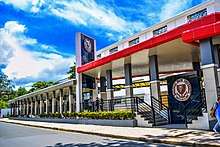 BatStateU Pablo Borbon Main I |
BatStateU Pablo Borbon Main II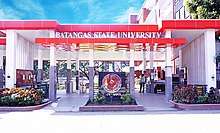 Golden Country Homes Subdivision, Alangilan, Batangas City |
BatStateU ARASOF Nasugbu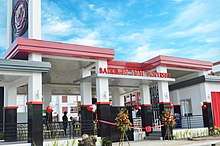 R. Martinez St., Brgy. Bucana, Nasugbu, Batangas |
BatStateU Balayan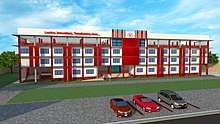 Brgy. Caloocan, Balayan, Batangas |
BatStateU Lemery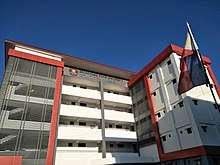 Rajah Matanda St., Brgy. Bagong Sikat, Lemery, Batangas |
BatStateU Mabini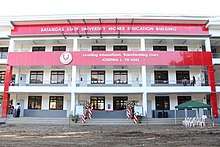 Sitio Mailayin, Brgy. P. Niogan, Mabini, Batangas |
BatStateU JPLPC Malvar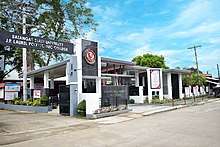 G. Leviste St., Poblacion, Malvar, Batangas |
BatStateU Lipa – Don Claro M. Recto Campus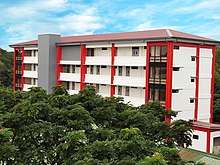 Marawoy, Lipa City, Batangas |
BatStateU Rosario – Jose B. Zuno Campus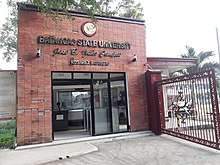 Brgy. Namunga, Rosario, Batangas |
BatStateU San Juan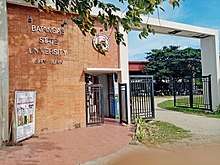 Talahiban II, San Juan, Batangas |
BatStateU Lobo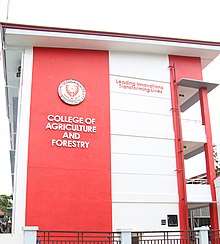 Brgy. Masaguisit, Lobo, Batangas | |
Vision, Mission, Core Values
Vision
A premier national university that develops leaders in the global knowledge economy.
Mission
A university committed to producing leaders by providing a 21st century learning environment through innovations in education, multidisciplinary research, and community and industry partnerships in order to nurture the spirit of nationhood, propel the national economy, and engage the world for sustainable development.
Core values
The university has six core values: Patriotism, Service, Integrity, Resilience, Excellence, and Faith.
University Symbols
.png)
Red Spartans
The Red Spartans is the official mascot of the university. It was launched on 23 September 2014 during the 111th Foundation Anniversary of the institution. Designed by John Jeffrey Alcantara, a Fine Arts major of the university, it was officially registered at the Intellectual Property Office of the Philippines on 15 April 2016 with Certificate of Registration No. 4/2014/00013631.[40]
Leading Innovations, Transforming Lives
Leading Innovations, Transforming Lives is the official motto of the university. It was registered at the Intellectual Property Office of the Philippines on 15 April 2016 with Certificate of Registration No. 4/2014/00013632. This is used in all official publications, newsletters, pamphlets, and brochures published by the University, as well as in official university merchandise sold at the University Shop. It carries with it the University's long standing tradition of service, excellence, and virtue, as specified in its official seal, and is anchored on the goal of maximizing its relevance and transformative impact through innovations in instruction, research, and community service.
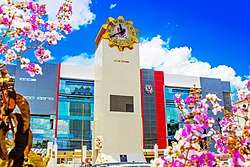
Tower of Wisdom
In an evening fellowship on 19 November 2016, the university marker named Tower of Wisdom was inaugurated in its Main Campus during the 113th founding anniversary of Batangas State University. The design was conceptualized by Dr. Tirso Ronquillo, and was applied at the Intellectual Property Office as an Industrial Design on 15 November 2016. The structure rests on a 16 meter long and 11.3 meter wide platform, to symbolize the 16th year of the current century and the 113th founding anniversary of the institution. It is 19.03 meters high, symbolic of the year the institution was founded. Through Resolution No. 729, s.2017, the Board of Regents declared the Tower of Wisdom as the official landmark of the university.
Academics
Program Offerings
The university offers academic programs in engineering, architecture, fine arts, interior design, law, computer science, information technology, industrial technology, teacher education, nursing, dietetics, accountancy, management accounting, business administration, entrepreneurship, public administration, customs administration, tourism management, hospitality management, development communication, criminology, biology, chemistry, mathematics, agriculture, forestry, and fisheries and aquatic sciences.[41]
Recently, the university started offering programs in disaster risk management, the first in the CALABARZON region. [42] It also has an Integrated School in its Main Campus I and a Laboratory School in its Nasugbu campus, both offering basic education, junior high school, and senior high school (STEM strand) under a science and technology-based curriculum. Huawei Technologies Philippines, Inc. also partnered with the university in offering the first Huawei ICT Academy in CALABARZON region, and the seventh academy in the country.[43][44]
Offered in multiple sites for increased student access to quality education, the University's academic programs are anchored on pragmatic, relevant, and socially responsive curricula. These are government recognized and issued certificates of program compliance by the Commission on Higher Education. In addition, its programs are regularly accredited by the Accrediting Agency of Chartered Colleges and Universities in the Philippines or AACCUP, Inc. Several of its programs have already reached Level IV, the highest level of accreditation by AACCUP. These are the Mechanical Engineering, Elementary Education, Secondary Education, and Development Communication programs. Other programs have passed Level IV-Phase 1, and will undergo the Phase 2 evaluation before being awarded Level IV accreditation. In 2015, AACCUP awarded Batangas State University as the Top 2 state university with the most number of accredited programs in the country.[45]
The College of Engineering, Architecture and Fine Arts offers the university's flagship degree programs, and is a pioneer in the full implementation of outcomes-based teaching and learning and the integration of Technopreneurship in its curricula.[46] Aside from AACCUP, its programs are also regularly accredited by the Philippine Technological Council or PTC, the umbrella organization of engineering professionals in the Philippines, and the US-based Accreditation Board for Engineering and Technology.
New Academic Programs
As part of the university's ten-year strategic plan, Batangas State University offers new graduate and undergraduate programs with curricula that reflect 21st century competencies along emerging industries. These include aerospace engineering, geological engineering, geodetic engineering, biomedical engineering, automotive engineering, transportation engineering, metallurgical engineering, naval architecture and marine engineering, public health for disaster response, and ceramics engineering for the undergraduate programs.
The new graduate programs are on urban planning and design, construction management, materials science engineering, transportation engineering, engineering management, engineering education, supply chain management, port management, advanced manufacturing, data science and analytics, artificial intelligence, energy engineering, and earthquake engineering.[47]
| GRADUATE AND UNDERGRADUATE PROGRAMS | ||
|---|---|---|
| COLLEGE OF ENGINEERING, ARCHITECTURE AND FINE ARTS
Doctor of Philosophy in Electronics Engineering Doctor of Philosophy in Engineering Management Doctor of Philosophy in Engineering Education Master of Science in Electronics Engineering Master of Science in Computer Engineering Master of Science in Artificial Intelligence Master of Science in Advanced Manufacturing Master of Science in Alternative Energy Engineering Master of Science in Construction Management Master of Science in Earthquake Engineering Master of Science in Naval Architecture Master of Science in Transportation Engineering Master of Science in Materials Engineering Master in Urban Planning and Design Master in Engineering Management Master of Engineering • Major in Civil Engineering • Major in Chemical Engineering • Major in Computer Engineering • Major in Electrical Engineering • Major in Electronics Engineering • Major in Environmental Engineering • Major in Industrial Engineering • Major in Mechanical Engineering Bachelor of Science in Chemical Engineering Bachelor of Science in Civil Engineering Bachelor of Science in Computer Engineering Bachelor of Science in Electrical Engineering • Major in Machine Automation & Process Control • Major in Renewable Energy Resource Design Bachelor of Science in Electronics Engineering • Major in Information & Communication Technology • Major in Microelectronics Bachelor of Science in Food Engineering Bachelor of Science in Industrial Engineering Bachelor of Science in Instrumentation & Control Engineering Bachelor of Science in Mechanical Engineering Bachelor of Science in Mechatronics Engineering Bachelor of Science in Petroleum Engineering Bachelor of Science in Sanitary Engineering Bachelor of Science in Automotive Engineering Bachelor of Science in Aeronautics Engineering Bachelor of Science in Material Science and Engineering Bachelor of Science in Transportation Engineering Bachelor of Science in Biomedical Engineering Bachelor of Science in Geodetic Engineering Bachelor of Science in Geology/Geological Engineering Bachelor of Science in Ceramics Engineering Bachelor of Science in Metallurgical Engineering Bachelor of Science in Architecture Bachelor of Science in Naval Architecture and Marine Vehicle Engineering Bachelor of Fine Arts major in Visual Communication Bachelor of Science in Interior Design |
COLLEGE OF ACCOUNTANCY,
BUSINESS, ECONOMICS AND INTERNATIONAL HOSPITALITY MANAGEMENT Doctor of Public Administration Doctor of Business Administration Master of Science in Port Management Master of Science in Supply Chain Management Master of Business Administration Master in Public Administration Master in Logistics Management/Port Administration Master in Disaster Risk Management Diploma in Disaster Risk Management Bachelor of Science in Accountancy Bachelor of Science in Business Administration • Major in Business Economics • Major in Financial Management • Major in Human Resource Management • Major in Marketing Management • Major in Operations Management Bachelor of Science in Hospitality Management Bachelor of Science in Tourism Management Bachelor in Public Administration Bachelor of Science in Customs Administration Bachelor of Science in Entrepreneurship Bachelor of Science in Management Accounting Bachelor of Science in Public Health for Disaster Response COLLEGE OF NURSING AND ALLIED HEALTH SCIENCES Bachelor of Science in Nursing Bachelor of Science in Nutrition and Dietetics COLLEGE OF LAW Bachelor of Laws COLLEGE OF INDUSTRIAL TECHNOLOGY Doctor of Technology Master of Technology Bachelor of Industrial Technology • Major in Automotive Technology • Major in Civil Technology • Major in Computer Technology • Major in Drafting Technology • Major in Electrical Technology • Major in Electronics Technology • Major in Food Technology • Major in Instrumentation and Control Technology • Major in Mechanical Technology • Major in Mechatronics Technology • Major in Welding and Fabrication Technology COLLEGE OF INFORMATICS AND COMPUTING SCIENCES Master of Science in Computer Science Master of Science in Information Technology Master of Science in Data Science and Analytics Bachelor of Science in Computer Science Bachelor of Science in Information Technology • Major in Service Management Track • Major in Business Analytics Track • Major in Network Technology Track |
COLLEGE OF TEACHER EDUCATION
Doctor of Education in Educational Management Doctor of Philosophy in Educational Management Doctor of Philosophy in Mathematics Education Master of Arts in Education • Major in Educational Management (Thesis/ Non-Thesis Program) • Major in Mathematics Teaching • Major in Science Teaching • Major in English Language Teaching • Major in Filipino Language Teaching • Major in Physical Education • Major in Psychology • Major in Social Studies Teaching • Major in Technology and Livelihood Education Teaching Bachelor of Elementary Education Bachelor of Early Childhood Education Bachelor of Secondary Education • Major in Science • Major in English • Major in Filipino • Major in Mathematics • Major in Social Studies Bachelor of Technology & Livelihood Education • Major in Home Economics Bachelor of Technical-Vocational Teacher Education • Major in Garments, Fashion and Design • Major in Electronics Technology • Major in Electrical Technology • Major in Automotive Technology • Major in Computer Programming Technology • Major in Food and Service Management Bachelor of Physical Education COLLEGE OF ARTS AND SCIENCES Doctor of Philosophy in English major in Language and Literature Master of Arts in English major in Language and Literature Master of Science in Mathematics Master of Chemistry Master in Development Studies Bachelor of Arts in English Language Studies Bachelor of Science in Biology Bachelor of Science in Chemistry Bachelor of Science in Criminology Bachelor of Science in Development Communication Bachelor of Science in Mathematics Bachelor of Science in Psychology COLLEGE OF AGRICULTURE & FORESTRY Bachelor of Science in Agriculture Bachelor of Science in Forestry INTEGRATED SCHOOL Kindergarten Grades I – VI Grades VII - X - Junior High School Grade XI-XII - Senior High School |
Academic Calendar
In compliance with Republic Act No. 7797, the Board of Regents approved the movement of the university's academic calendar from June–March to August–May starting in 2016.[48] This was also done to align the university's academic calendar with that of the ASEAN and the international community.
Libraries and Laboratories
The University library hosts a wide collection of references and subscriptions to journals, magazines, and newspapers.[49] It has an e-Library system with library automation software that supports the Destiny Library Manager for a more detailed transaction in online circulation, inventory reporting, computerized logbooks, and utilization reports.[50] The university also has access to IEEE XPlore and Science Direct. The library's website has been redesigned to include new features such as the enhancement of the Online Public Access Catalog or OPAC, the inclusion of e-journals, e-books, and other library resources section, library space reservations feature, and enhanced borrowing and reservation feature. Recently, the University has realigned its budget for subscription to digital content, ensuring that the University Library remains a relevant environment for faculty and students to acquire resources essential for their teaching, learning, and research. Soon, the University's Science, Technology, Engineering, Agriculture and Mathematics (STEAM) Library will be inaugurated in its main campus.[49]

Each college has program-specific laboratories to support hands-on, simulated learning and application of theories. One of the most recent laboratories established is the fabrication laboratory called the Labspace for Innovation Knowledge-Honing and Application (LIKHA FabLab), which is part of the university's Manufacturing Research Center. Located in the Science, Technology, Engineering, and Environment Research or STEER Hub, this laboratory has a high quality research infrastructure for developing models and making prototypes for mass production. It was established in 2018 through a grant from the Department of Trade and Industry of P12 million worth of state-of-the-art equipment and facilities to accommodate university students and micro, small and medium enterprises (MSMEs). It is equipped and ready for digital designs, 3D printing, laser engraving/cutting, CNC wood router, vacuum formatting, large format printing, and CNC metal milling.[51]
In response to the need for personal protective equipment or PPE due to the COVID-19 global pandemic in early 2020, the LIKHA FabLab fabricated the Red Spartan Face Shields. Along with masks, face shields are a basic requirement for health workers as an additional barrier to reduce the risk of viral transmission via airborne droplets. Through the Optimized Vacuum Forming Method for fabricating the face shield, the LIKHA FabLab reduced the time of fabrication to six minutes per face shield as compared to the one hour and 46 minutes just using the 3D printing process. As of June 2020, the LIKHA FabLab has already produced over 2,000 face shields distributed among health care professionals and frontline personnel in Batangas.[52][53]
Learning Management System
The University has a virtual learning environment initially utilized by graduate school professors but was eventually used by undergraduate students as well. It partnered with Google for the Google Education program, enabling the faculty and students to have free, unlimited access to G Suite and all its products and features. [54]
The University recently established its Center for Transformative Learning (CenTRaL), which serves as the university’s arm in harnessing innovative technologies in delivering alternative modes of teaching and learning. It has three major components: capacity building and training, ICT technical services, and content development and evaluation. [55]
Admissions, Scholarships and Housing
Prospective students need to pass the BatStateU Admission Test prior to admission. Applicants are guided through the University's online facility on how to apply and qualify to take the entrance examination. There are four filing centers and six testing centers in the university. The Admission Test is administered once a year, with all information about application and test dates regularly announced through the University's website. Upon passing the test, registration of students can be done online or through physical office transactions.[56]
In terms of scholarships, Filipino students who pass the college entrance examination can enjoy the free tuition and miscellaneous fees provided for in RA 10931 or the Universal Access to Quality Higher Education Act of 2018.[57] Foreign nationals, on the other hand, are welcome and will be assisted by the Office for External Affairs. The University gives financial assistance and support to students through its Scholarship and Financial Assistance Office. In addition, some industries and institutional partners provide financial assistance to qualified students.
The university has a hostel in BatStateU Main I and in BatStateU ARASOF-Nasugbu, and a student dormitory in BatStateU Main II. In addition, the Office for Student Housing and Residential Services accredits boarding houses and dormitories outside of the university to ensure the safety and convenience of its students.
Awards and Recognitions
International Recognition and Accreditation

In March 2020, Quacquarelli Symonds or QS Stars University rating gave Batangas State University a three-star rating, which makes it part of the Top Universities list. It received five stars for Teaching; four stars for Employability; one star for internationalization; two stars for Academic Development; three stars for Facilities; four stars for Inclusiveness; two stars for Specialist Criteria: Innovation; and four stars for Specialist Criteria: Electronics Engineering.[23]


Batangas State University is also the first state university in the Philippines with engineering and information technology programs accredited by the Accrediting Board for Engineering and Technology or ABET. The ABET – Engineering Accreditation Commission awarded accreditation to eight engineering programs of the university: Chemical Engineering, Civil Engineering, Computer Engineering, Electrical Engineering, Electronics Engineering, Industrial Engineering, Mechanical Engineering, and Sanitary Engineering. In addition, the ABET – Computing Accreditation Commission has accredited the university's Information Technology program.[20]

TÜV Rheinland Philippines, Inc. awarded the university the ISO 9001:2008 certification in December 2017, and the ISO 9001:2015 certification after passing the external surveillance audit in September 2018. The ISO certification covers the design, development, and implementation of higher education services.[17]
National Awards and Citations
In 2016, the Commission on Higher Education selected Batangas State University as a Model Higher Education Institution. This made BatStateU a host university for the Philippine Higher Education Career System - Executive Development Program or EDP, which is part of the University Dynamics Laboratory of CHED in partnership with the Development Academy of the Philippines. The University hosted ten candidates of the EDP from 26 November to 1 December 2016.[14]
CHED also recognizes the University's Electronics Engineering program as a national Center of Excellence, while its Electrical Engineering, Mechanical Engineering, Development Communication, and Teacher Education programs are designated as national Centers of Development. Over 190 of its graduates also topped national licensure and certification examinations administered by the country's Professional Regulations Commission or PRC in various fields as of December 2019. Specifically, Batangas State University has been consistently hailed as top performing school in the Mechanical Engineering licensure examination, making it one of the top mechanical engineering schools in the country.[15][16]
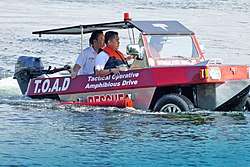
Two of Batangas State University's research projects received the National Gawad KALASAG (KAlamidad at Sakuna LAbanan, SAriling Galing ang Kaligtasan) award from the Office of Civil Defense – National Disaster Risk Reduction and Management Council or NDRRMC. The amphibious vehicle known as the Tactical Operative Amphibious Drive or TOAD, which can be used for rescue operations during heavy floods, received the special award in November 2016.[58] On the other hand, the Solar-Powered Isotropic Generator of Acoustic Wave or SIGAW, which is a tsunami early warning device, received Special Recognition during the Gawad Kalasag awards night in December 2018. Gawad Kalasag is an annual awarding ceremony for significant initiatives in the promotion and advancement of DRRM in the country.[59]
During the 2019 Search for Sustainable and Eco-friendly Schools, Batangas State University was awarded as the Regional Champion for CALABARZON. The university also received the Nestle Water Leadership Award and the One Meralco Energy Leadership Award. In ceremonies held on 22 November 2019, the university was adjudged as the National Winner – College Level for the Energy Leadership Award. The biennial Search is organized by the Department of Environment and Natural Resources through the Environment Management Bureau, in collaboration with the Department of Education (DepED), and the Commission on Higher Education, with support from Nestle Philippines, Inc., One Meralco Foundation, Inc., and Smart Communications, Inc.[60]
Internationalization
The university is a lifetime member of the Association of Universities of Asia and the Pacific, and a member of the University Mobility in Asia and the Pacific. It is also a member of the ASEAN Federation of Engineering Organizations, composed of engineering institutions and organizations of ASEAN countries.
The university has also established partnerships with foreign universities, organizations, and industries as part of its internationalization program. These include USAID Global Research and Innovation Fellowship Network or GRIFN, the United Nations World Food Programme, the Center for Appropriate Technology (Gruppe Angepasste Technologie-GrAT) in Austria, Texas A&M University in the USA, Kochi University in Japan, Singapore Polytechnic in Singapore, Global Korean Nursing Foundation in South Korea, Universiti Teknologi Malaysia in Malaysia, International University in Cambodia, Universiti of Transport and Technology in Vietnam, and Shanghai University of Electric Power in China, among others. It is also host to the first China-Philippines Silk Road Institute in the country, [18] which was launched on 10 December 2019 in its main campus. Recently, it partnered with the National University in California, USA, and the Malaysia Institute of Supply Chain Innovation, which is a member of the Massachusetts Institute of Technology (MIT) Global SCALE (Supply Chain and Logistics Excellence) Network.
As part of its personnel development program, the University sends its faculty to foreign universities for advanced studies, immersion, study visits, and benchmarking. A number of faculty members have been sent to the University of California in Berkeley, the Erasmus University in Rotterdam in the Netherlands, Louisiana State University in Baton Rouge, Louisiana, USA, the National Sun Yat-Sen University in Taiwan, and Pusan National University in Busan City, South Korea.[61] It also has a student exchange program in partnership with the Rajamangala University of Technology Thanyaburi in Thailand, and regularly sends its teacher education students to the Thai Nguyen University of Agriculture and Forestry in Vietnam for their internship and practice teaching.
In 2015, the Board of Regents approved the Balik-Scientist / Balik-Professional Program, wherein Filipino scientists who are based or have served in foreign countries are invited to the University to share their expertise and provide technical assistance in the conduct of research and development activities. Since then, the University has hosted several scientists, including Dr. Josefino Comiso from the University of California, Los Angeles, who is a senior research scientist at the Cryospheric Sciences Laboratory of the NASA Goddard Space Flight Center and specializes on polar oceanography, climate change and satellite remote sensing.[62] Other Balik-Scientists engaged by the University are Dr. Rodrigo Jamisola Jr. of Botswana International University of Science and Technology in Botswana, Southern Africa in the field of robotics and autonomous underwater vehicles; Dr. Pher Errol Quinay of the University of Tokyo, Japan in the field of computational earthquake engineering; Dr. Ginno Lizano Andres of Ritsumeikan University, Japan for capacitive deionization technology;[63] and Dr. Abigail Cid of Kyoto University, Japan, on stable isotope of oxygen in phosphate and its analysis.
The biennial International Research Conference on Innovations in Engineering, Science, and Technology (IRCIEST) is hosted by the university, most recent of which was held on 04-6 December 2019. It was the fourth IRCIEST and centered on topics relative to the Fourth Industrial Revolution, hence it was called IRCIEST 4.0. Keynote speakers in previous conferences include Engr. Diosdado “Dado” Banatao of Tallwood Venture Capital, Dr. David Hall of USAID- STRIDE Program, Mr. Sagiv Massad of the Technology and Cyber Security Business Profile in Israel, and Hon. Fortunato T. Dela Peña, Secretary, of the Philippines’ Department of Science and Technology.[64] In 2018, the University hosted the first ASEAN Conference and Exposition on Disaster Risk Management and Climate Change Adaptation, in partnership with Universiti Teknologi Malaysia and National University of Kaohsiung Taiwan. USec. Ricardo B. Jalad of the Department of National Defense served as the keynote speaker in the conference.[65]
The University’s College of Engineering, Architecture and Fine Arts has 29 ASEAN Engineers in its faculty roster, awarded by the ASEAN Federation of Engineering Organisations (AFEO), which facilitates the mobility of engineers within ASEAN countries. In addition, the college also has memberships in international professional organizations:
| American Society for Engineering Education, USA;
Australasian Association for Engineering Education, Australia; American Society for Testing and Materials International, USA; Society of Manufacturing Engineers, USA and Canada; American Institute of Chemical Engineers, USA; Association for Computing Machinery, USA; Association of Automotive Engineers of Japan; Association of Energy Engineers, USA; Institute of Transportation Engineers, USA; Society of Naval Architects and Marine Engineers, USA; The American Ceramic Society, USA; Data Science Association, USA; |
Construction Management Association of America, USA;
Aerospace and Electronic Systems Society, USA; Computational Intelligence Society, USA; IEEE Education Society ,USA; IEEE Control Systems Society, USA; Engineering in Medicine and Biology Society, USA; Geoscience and Remote Sensing Society, USA; Instrumentation and Measurement Society, USA; Robotics and Automation Society, USA; Technology and Engineering Management Society, USA; Society of Petroleum Engineers. |
In addition, it is also a member of national associations such as Aerospace Industries Association of the Philippines; Semiconductor and Electronics Industries in the Philippines, Inc.; Institute of Electronics Engineers of the Philippines; Institute of Integrated Electrical Engineers; Philippines; Philippine Institute of Civil Engineers; Philippine Institute of Chemical Engineers; Philippine Society of Sanitary Engineers; Philippine Society of Mechanical Engineers; Philippine Institute of Industrial Engineers; and the United Architects of the Philippines.
Research and Innovation
Batangas State University has one of the largest research and training infrastructure in the region, the seven-storey CALABARZON Integrated Research and Training Center (CIRTC) located in its Main Campus I. In 2017, it was endorsed by the Regional Development Council of Region IV-A as CALABARZON’s Center for analytical testing and research services.[66] It also has a Food Innovation Center or FIC in its Main Campus II, which serves as a hub for innovations on product/process development, and provides marketing strategies, food analysis, food safety, and quality training. FIC is not only limited to the BatStateU community but also serves Micro, Small and Medium Enterprise in Batangas Province where it envisions to transform the livelihood of the communities.[66]
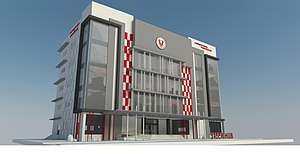
The Science, Technology, Engineering and Environment Research Hub or STEER Hub is located in its Main Campus II in Brgy. Alangilan, Batangas City.[67] It houses the Center for Technopreneurship and Innovation, the Innovation and Technology Support Office, the LIKHA FabLab (Manufacturing Research Center), the Electronic Systems Research Center, the Environment Research Center, the ICT Research Center, and the Material Science and Testing Research Center. The STEER Hub is endorsed by the Regional Development Council of Region IV-A as CALABARZON’s Center for Science, Technology, Engineering and Environmental Research.[66]
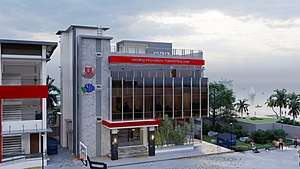
In February 2018, the University established its newest research center, the Verde Island Passage Center for Oceanographic Research and Aquatic Life Sciences or VIP CORALS. Located in its campus in Lobo, Philippines, the center provides research, teaching, and extension services relevant to the marine resources and its marine environment in the Verde Island Passage. The center also trains LGUs in the Verde Island Passage on marine protection, livelihood programs, and policy formulation, boosting the local tourism industry.[68][66] On 20 September 2019, it co-hosted a symposium entitled Saknungan sa VIP 2019 with the De La Salle University-Manila- Br. Alfred Shields Ocean Research Center and the California Academy of Sciences.[69] It has also hosted Dr. Kent Carpenter, a professor at Old Dominion University in Norfolk, Virginia for a lecture-forum on 20 November 2019 on the environmental damage to coral reefs in the South China Sea. It was Dr. Carpenter's research which revealed that the Verde Island Passage is the center of the center of marine biodiversity in the world.[70]
The University also has an Analytical Laboratory and Testing Services Center to cater to biotechnology and natural products, as well as a Social Innovation Research Center that focuses on research-based extension and community services. It also has a research center focused on Disaster Risk Management, called the Innovation and Advanced Computing Technologies for Disaster Risk Management or iACT4DRM. This is part of a bigger center, called the Adaptive Capacity-Building and Technology Innovation for Occupational Hazards and National Disaster or ACTION Center.[71]
KIST Park
On 22 May 2020, President Rodrigo Roa Duterte designated the BatStateU Knowledge, Innovation, and Science Technology (KIST) Park as a Special Economic Zone (Information Technology Park) by virtue of Proclamation No. 947. [24] It is the first KIST Park registered by the Philippine Economic Zone Authority or PEZA. The BatStateU KIST Park is envisioned as the country's primary seedbed and enclave for technology that nurtures the development and growth of new, small, high-tech firms. It facilitates the transfer of university know-how to locator- companies, encourages the development of faculty or student-based spin-offs, and stimulates the development of innovative products and processes. [24][25]
Located at the BatStateU Pablo Borbon Main II in Brgy. Alangilan, Batangas City, the KIST Park promises to enable business activity in the area by activating incubation and stimulating the creation of new innovative enterprises. Its proximity to the National Capital Region as well as accessibility to other parts of the country makes it a top location for technology transfer and commercialization in the Philippines and a central point of contact for innovative technology-based start-ups looking to transform knowledge into marketable products and services. [24][25]
Its national launching ceremony took place virtually on July 20, 2020. [26] It was attended by Atty. Mcjill Fernandez, Deputy Executive Secretary for General Administration of the Office of the President, Sec. Ramon Lopez of DTI, Sec. Fortunato dela Pena of DOST, PEZA Director General BGen. Charito Plaza, and other key government officials and industry representatives. [32]
Extension and Community Service
The Adopt-a-Barangay program is the university's flagship program on extension and community services. Started in 2014 through a comprehensive needs assessment, the program benefited ten communities within the University's service areas, selected using the Community-Based Monitoring System of the Province of Batangas. Much of the University's community-oriented, research-based extension services have been focused on these barangays. More than 300 community-oriented extension services are conducted annually by the University, with more than 20,000 beneficiaries in each year.
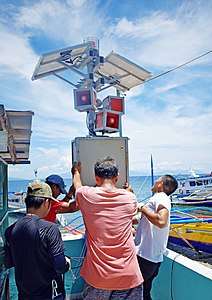
Anchored on a ten-point agenda, the Extension Service Program consists of Environment and Natural Resources; Conservation, Protection and Rehabilitation; Technology Transfer, Utilization and Commercialization; Technical Assistance and Advisory; Technical-Vocational Education and Training; Social Development; Parents’ Empowerment through Social Development (PESODEV); Disaster Preparedness and Response/ Climate Change Adaptation; Gender and Development; Community Outreach; and Smart Analytics and Engineering.[72]
The University also regularly transfers its developed technologies to communities that need them. Significant technologies transferred include the Solar Isotropic Generator of Acoustic Wave, which is a tsunami Early Warning System installed in selected barangays in Batangas and Quezon provinces. The project was co-funded by the United Nations World Food Programme or UNWFP and DOST IV-A. Another project is the Solar Fish Dryer, which is a robust drying chamber powered by solar energy installed in a community in Taal Lake in Batangas and in Quezon Province. BRYCE, a biodiesel reactor designed to convert used cooking oil into biodiesel, was transferred to a Gawad Kalinga community in Batangas City.[73]
Singapore Polytechnic or SP partnered with the University in the conduct of the Learning Express (LeX) Program. This involves Social Innovation Projects where students from Singapore Polytechnic engage in livelihood and volunteer programs that enable them to address the needs of the local communities while developing their academic skills using the Design Thinking Methodology. Several faculty members of the University are sent to Singapore for orientation and continuous training on project implementation and monitoring.[74]
Strategic Plan 2019-2029
Led by the University President, the Executive Committee and the university's various stakeholders started working on the University Strategic Plan 2019–2029 in the third quarter of 2018. It was approved by the Board of Regents through Resolution No. 87, s.2019. [33]
Covering a ten-year period, the Strategic Plan serves as the University's blueprint towards achieving a wide spectrum of development, thereby ensuring that holistic reforms and strategic initiatives are sustained. The strategic planning process underwent several phases, from direction setting, environmental scanning, gap analysis, multi-stakeholders consultation, consolidation of inputs, milestones setting, and actual crafting of the plan. It was endorsed by the university’s Academic and Administrative Councils, and after approval by the Board of Regents, it was officially launched in ceremonies in December 2019, attended by the university’s internal and external partners. [33]
It is anchored on six pillars that represent the University Goals or BASICS: Brand of Excellence, Access, Social Relevance, Inclusive Innovation, Capacity, and Sustainability. The BASICS are geared towards meeting the University's vision of achieving national relevance and global presence, as it scales greater heights of excellence in innovation and social transformation. [33]
Media outlets
BSU has two student-run media outlets namely The Lathe Group of Publications and its own college radio DWPB-FM 107.3 FM, first established in the 2000s.
References
- "Republic Act No. 9045". Chan Robles Virtual Law Library. Retrieved 30 September 2014.
- Acorda, Delia H.; Del Mundo, Sherry Joy A.; De la Peña, Divina Gracia F.; Gaba, Flerida P.; Sunto, Cizlie C. & Tabujara, Bonifacia Nelsie A. (2006). BSU Integrated School Student Handbook 2006–2007. Batangas City, Philippines. pp. 1–3.
- The University staffers (October 2014). "Dr. Tirso Ronquillo Elected President for Batangas State University, Philippines" (PDF). The University. 14. Hilo, Hawaii, United States of America. p. 2. Retrieved 30 June 2017.
- Tampis, Glen H. (August 2016). "Student body drops by 17 percent". The LATHE. XLI (1). Batangas City, Philippines. p. 1.
- "BatStateU is IV-A's Top Performing School in campus journalism". SENSUS COMMUNIS: The LATHE Journal 2014–2015. Batangas City, Philippines: The LATHE: Group of Publications: 14. 2014.
- Batangas State University (2017). "University Hymn". Batangas State University 49th Commencement Exercises. Batangas City, Philippines. p. 17.
- The LATHE staffers (September 23, 2014). "The Birth of the Red Spartans" (PDF). The LATHE Foundation Week 2014 Special Edition. 1 (2). Batangas City, Philippines. p. 1. Archived from the original (PDF) on 6 October 2014. Retrieved 30 September 2014.
- "2016 SUC Levelling Results, SUC Levelling Benefits, and SUC Levelling Appeal Procedures" (PDF). Commission on Higher Education. June 22, 2018. Archived (PDF) from the original on June 22, 2018. Retrieved July 24, 2020.
- "History – Batangas State University". batstate-u.edu.ph. Retrieved 2020-07-24.
- "Batangas State University (Formerly known as Pablo Borbon Memorial Institute of Technology or TRADE) | WOWBatangas.com - Ang Official Website ng Batangueño". 2008-12-17. Retrieved 2020-07-24.
- "Republic Act No. 5270 : REPUBLIC ACTS - PHILIPPINE LAWS STATUTES and CODES". laws.chanrobles.com. Retrieved 2020-07-24.
- "Republic Act No. 9045". Official Gazette of the Republic of the Philippines. March 22, 2001. Retrieved July 24, 2020.
- Taylor, Ann C. M.; Waldmann, Suada (1997), "World List of Universities and other Institutions of Higher Education", World List of Universities and other Institutions of Higher Education, London: Palgrave Macmillan UK, pp. 1–1128, ISBN 978-1-349-13492-2, retrieved 2020-07-24
- "BatStateU hosts the University Dynamics Laboratory – Batangas State University". batstate-u.edu.ph. Retrieved 2020-07-24.
- "List of Centers of Excellence (COEs) and Centers of Development (CODs)" (PDF). Commission on Higher Education. Archived (PDF) from the original on May 2016. Retrieved July 24, 2020.
- "CHED designates BatStateU with Centers of Excellence and Development – Batangas State University". batstate-u.edu.ph. Retrieved 2020-07-24.
- "Batangas State University – Leading Innovations, Transforming Lives". batstate-u.edu.ph. Retrieved 2020-07-24.
- China-Philippines Silk Road Institute established at BatStateU. Batangas City, Philippines: Batangas State University Chronicle, The Official Publication of the Office of the President. 2019. p. 13.
- "BatStateU CEAFA". batstate-u.edu.ph. Retrieved 2020-07-24.
- "BatStateU CEAFA". batstate-u.edu.ph. Retrieved 2020-07-24.
- "APS". amspub.abet.org. Retrieved 2020-07-24.
- Notable Research Awards as of June 2018. Batangas City, Philippines: Batangas State University President’s Report 2014-2018. 2019. p. 46.
- "Batangas State University". Top Universities. 2020-05-19. Retrieved 2020-07-24.
- "Proclamation No. 947, s. 2020". Official Gazette of the Republic of the Philippines. May 22, 2020. Archived from the original on May 22, 2020. Retrieved July 24, 2020.
- July 6, BatStateU KIST Park Published on; 2020. "BatStateU heralds the country's first KIST Park". pia.gov.ph. Retrieved 2020-07-24.CS1 maint: numeric names: authors list (link)
- Quadra-Balibay, Aurora (2020-07-20). "JUST IN: Philippines' newest Special Economic Zone IT Park rises in Batangas State University". Good News Pilipinas. Retrieved 2020-07-24.
- "History". Batangas State University. Retrieved 30 June 2017.
- "Republic Act No. 741". Chan Robles Virtual Law Library. Retrieved 6 May 2014.
- "Republic Act No. 1957". Chan Robles Virtual Law Library. Retrieved 30 June 2017.
- "Republic Act No. 4582". Chan Robles Virtual Law Library. Retrieved 6 May 2014.
- "Republic Act No. 5270". Chan Robles Virtual Law Library. Retrieved 6 May 2014.
- "BatStateU launches first PH KIST Park". The Manila Times. 2020-07-23. Retrieved 2020-07-24.
- BatStateU launches Strategic Plan 2019-2029. Batangas City, Philippines: Batangas State University Chronicle, The Official Publication of the Office of the President. 2019. pp. 11–12.
- BatStateU Office of Student Affairs and Services (2014). Norms and Conduct for College Students AY 2014–2015. Batangas City, Philippines. p. 1.
- Cantos, Jesus Romelson "JR" (December 17, 2008). "Batangas State University (Formerly known as Pablo Borbon Memorial Institute of Technology or TRADE)". WOW Batangas. Retrieved 30 June 2017.
- "Nasugbu". Batangas State University. Retrieved 30 June 2017.
- "Republic Act No. 9472". Chan Robles Virtual Law Library. Retrieved 30 September 2014.
- "BSU-Mabini, Community Hospital Nag-groundbreaking". Provincial Government of Batangas (in Filipino and Tagalog). June 12, 2017. Retrieved 30 June 2017.
- "BatStateU launches its 11th campus in Mabini, Batangas – Batangas State University". batstate-u.edu.ph. Retrieved 2018-10-13.
- BatStateU launches University Mascot. Batangas City, Philippines: BatStateU Chronicle, The Official Newsletter of the Office of the President. 2015. p. 5.
- "Program Offering – Batangas State University". batstate-u.edu.ph. Retrieved 2020-07-24.
- "BatStateU opens DREAM Academy – Batangas State University". batstate-u.edu.ph. Retrieved 2020-07-24.
- "BatStateU to establish first Huawei ICT Academy in the region – Batangas State University". batstate-u.edu.ph. Retrieved 2020-07-24.
- "Huawei Expands ICT Academy to Batangas State University - SDN - Science & Digital News". SDN -- Science & Digital News. 2019-08-24. Retrieved 2020-07-24.
- "AACCUP recognizes BatStateU – Batangas State University". batstate-u.edu.ph. Retrieved 2020-07-24.
- "BatStateU CEAFA". batstate-u.edu.ph. Retrieved 2020-07-24.
- Curriculum Development workshops for emerging programs held. Batangas City, Philippines: Batangas State University Chronicle, The Official Publication of the Office of the President. 2020.
- "Republic Act No. 7797". Official Gazette of the Republic of the Philippines. August 25, 1994. Archived from the original on August 25, 1994. Retrieved July 24, 2020.
- "Batangas State University Library (Beta)". dione.batstate-u.edu.ph. Retrieved 2020-07-24.
- "Welcome to Batangas State University - Main Campus". helios.batstate-u.edu.ph. Retrieved 2020-07-24.
- "DTI, BatStateU launch LIKHA-FabLab – Batangas State University". batstate-u.edu.ph. Retrieved 2020-07-24.
- The ‘Red Spartan Face Shield’ Batangas State University’s Shield of Protection for Frontline workers combating CoViD-19. Batangas City, Philippines: Batangas State University Chronicle, The Official Publication of the Office of the President. 2020.
- "DTI's SSF LIKHA Fab Lab makes face shields for frontline workers". Department of Trade and Industry. March 27, 2020. Archived from the original on March 27, 2020. Retrieved July 24, 2020.
- "LEARNING MANAGEMENT SYSTEM - BATANGAS STATE UNIVERSITY ( UNOFFICIAL )". batstateu.gnomio.com. Retrieved 2020-07-24.
- "http://eldc.batstate-u.edu.ph/". Retrieved 2020-07-24. External link in
|title=(help) - "Admission and Registration – Batangas State University". batstate-u.edu.ph. Retrieved 2020-07-24.
- "Republic Act No. 10931". Official Gazette of the Republic of the Philippines. August 3, 2017. Archived from the original on August 3, 2017. Retrieved July 24, 2020.
- "BatStateU receives Gawad KALASAG 2016 Award – Batangas State University". batstate-u.edu.ph. Retrieved 2020-07-24.
- "BatStateU SIGAW Team bags National Gawad KALASAG Award – Batangas State University". batstate-u.edu.ph. Retrieved 2020-07-24.
- "DENR awards most sustainable and eco-friendly schools nationwide" (PDF). EMB. Archived (PDF) from the original on
|archive-url=requires|archive-date=(help). Retrieved July 24, 2020. - Batangas State University Strategic Plan 2018 Accomplishment Report – Instruction. Batangas City, Philippines: Batangas State University. 2019. pp. 1–2.
- "NASA Scientist, Dr. Josefino C. Comiso Visits BatStateU – Batangas State University". batstate-u.edu.ph. Retrieved 2020-07-24.
- Balik Scientist Program. Batangas City, Philippines: Batangas State University President’s Report 2014-2018. 2019. pp. 55–56.
- Fourth IRCIEST highlights Industry 4.0. Batangas City, Philippines: Batangas State University Chronicle, The Official Publication of the Office of the President. 2019. pp. 15–17.
- "Batangas State University leads 2018 ASEAN Conference and Exposition on Disaster Risk Management and Climate Change Adaptation (ACEDRMCCA) – Batangas State University". batstate-u.edu.ph. Retrieved 2020-07-24.
- Establishment of Research Centers. Batangas City, Philippines: Batangas State University President’s Report 2014-2018. 2019. p. 50.
- "BatStateU holds groundbreaking ceremony for STEER Hub – Batangas State University". batstate-u.edu.ph. Retrieved 2020-07-24.
- vipcorals. "The VIP CORALS Marine Repository Hub: Laying foundations for science and discovery in the VIP". Retrieved 2020-07-24.
- CAS, DLSU-Manila, BatStateU co-host Saknungan sa VIP 2019. Batangas City, Philippines: Batangas State University Chronicle, The Official Publication of the Office of the President. 2019. pp. 19–20.
- Dr. Kent Carpenter visits BatStateU. Batangas City, Philippines: Batangas State University Chronicle, The Official Publication of the Office of the President. 2019. p. 21.
- Share; Twitter; Twitter; Twitter. "Batangas State U opens disaster action center, DREAM Academy". pna.gov.ph. Retrieved 2020-07-24.
- "Batangas State University". maswais.batstate-u.edu.ph. Retrieved 2020-07-24.
- Cinco, Maricar (2017-05-13). "In Batangas, school equips coastal communities with tsunami warning device". INQUIRER.net. Retrieved 2020-07-24.
- "Singapore Polytechnic and BatStateU Students Undergo Immersion through Learning Express Program – Batangas State University". batstate-u.edu.ph. Retrieved 2020-07-24.